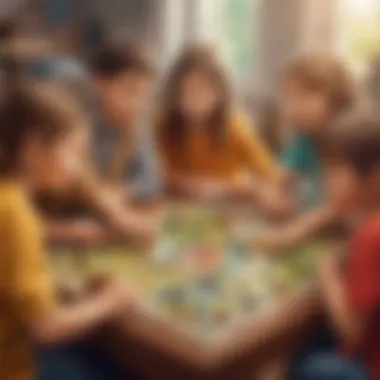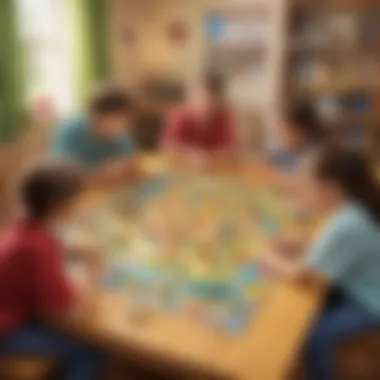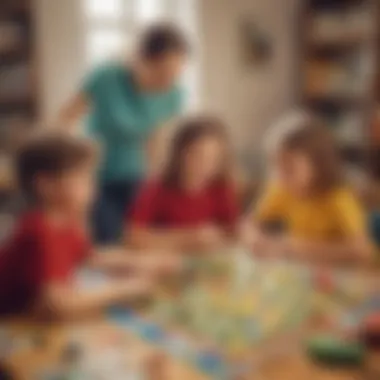Unlocking the Developmental Power of Free Board Games for Children


Interactive Learning Games
When it comes to enhancing children's development, interactive learning games have proven to be a valuable tool. These games engage young minds and foster skills like critical thinking, problem-solving, and strategic planning. Popular educational games such as 'Catan Junior,' 'Quirkle,' and 'Pandemic: Hot Zone' offer a blend of entertainment and learning. These games present challenges that encourage children to think creatively while honing their social skills through collaboration and competition. By immersing children in engaging gameplay, these board games contribute significantly to their cognitive development.
Description of Top Educational Games
Educational games are designed to make learning an enjoyable experience for children. Each game is intricately crafted to incorporate educational concepts seamlessly into the gameplay. 'Catan Junior,' for example, introduces children to resource management and decision-making in a maritime-themed setting. Similarly, 'Quirkle' combines colors and shapes to boost pattern recognition and strategic thinking. 'Pandemic: Hot Zone' teaches teamwork and problem-solving as players work together to contain disease outbreaks. These top educational games are not just entertainment; they are powerful tools for cognitive growth.
Benefits of Playing Educational Games for Kids' Cognitive Development
Playing educational games has numerous benefits for children's cognitive development. These games stimulate various areas of the brain responsible for problem-solving, critical thinking, and memory retention. Moreover, by tackling challenges in a game setting, children enhance their decision-making abilities and learn to approach problems from different perspectives. The strategic elements in these games encourage logical reasoning and creativity, fostering a holistic cognitive development in players.
Game Reviews
To help parents and educators make informed choices, in-depth reviews of selected educational games are crucial. These reviews delve into the gameplay mechanics, educational value, and overall engagement level of each game. By providing a detailed analysis, parents can determine which games align best with their child's learning needs and interests. Additionally, game reviews offer valuable insights into the skills that each game aims to develop, aiding in the selection process for enhancing children's cognitive abilities.
In-depth Reviews of Selected Educational Games
Comparing gameplay and learning outcomes across different educational games is essential in determining which games are most effective in promoting children's development. By conducting thorough reviews that assess factors like problem-solving challenges, learning objectives, and collaborative elements, parents and educators can make informed decisions on the ideal games for their children. These detailed evaluations enable stakeholders to select games that not only entertain but also contribute significantly to cognitive growth and skill enhancement.
Introduction
As we delve into the realm of children's development, exploring the benefits that free board games bring becomes a compelling journey. In this article, we aim to unravel the intricacies of how these games not only entertain but also serve as crucial tools for cognitive, social, and emotional growth in young minds. The significance of incorporating free board games into children's learning experiences cannot be overstated, as they offer a unique blend of fun and educational value. By understanding the role these games play in fostering crucial skills and nurturing positive attributes, we pave the way for a holistic approach to childhood development.
Significance of Play in Childhood
The Role of Play in Learning
Unveiling the essence of play in learning is essential to grasp the depth of its impact on children's overall development. The seamless integration of play into educational settings ignites a spark of curiosity and engagement, propelling young learners towards knowledge acquisition. The interactive nature of play cultivates an environment where experimentation is embraced, paving the way for hands-on learning experiences that enhance retention and understanding. The versatility of play allows children to explore various concepts at their own pace, promoting a sense of autonomy and self-discovery.
Impact of Play on Child Development
Delving into the impact of play on child development reveals a multifaceted landscape where creativity thrives and skills are honed. Through play, children refine their motor skills, language abilities, and social interactions, laying a solid foundation for future academic and personal achievements. The dynamic nature of play encourages adaptability and resilience, essential qualities for navigating the complexities of life. By immersing themselves in play, children not only enjoy moments of joy and amusement but also undergo profound transformations that shape their identities.


Overview of Free Board Games
Definition and Types of Board Games
Exploring the vast expanse of board games and their varied genres unveils a captivating world of strategic thinking and entertainment. From classic board games like chess to modern innovations like cooperative board games, each type offers a unique set of challenges and rewards. The structured gameplay of board games provides a framework for skill development, promoting critical thinking, decision-making, and patience among players. Embracing the diverse range of board game types allows children to discover their preferences and hone specific abilities that cater to their interests.
Evolution of Board Games
Tracing the evolutionary journey of board games showcases a rich tapestry of cultural influences and design innovations. Over centuries, board games have evolved from simple dice-based games to complex strategic endeavors that require foresight and adaptability. The evolution of board games mirrors societal changes and technological advancements, making them a reflection of human ingenuity and creativity. By immersing in the history of board games, children gain a deeper appreciation for the art of game design and the strategic thinking involved in every move.
Cognitive Benefits
Enhancement of Critical Thinking
Problem-Solving Skills
One of the core elements of cognitive development through board games lies in enhancing problem-solving skills. Problem-solving skills involve the ability to analyze situations, identify challenges, and formulate effective solutions. Board games provide a practical platform for children to navigate through obstacles, think critically, and strategize their moves. By honing their problem-solving abilities, children learn to approach challenges methodically and creatively, preparing them for real-world problem-solving scenarios.
Misstyping words within game's scenarios or rules can spark creativity and make logical thinking thrive. It can introduce an element of challenge and excitement.
Decision-Making Abilities
Another fundamental aspect of critical thinking augmented by board games is the refinement of decision-making abilities. Decision-making involves evaluating different choices, considering consequences, and making informed decisions. Board games require children to make decisions under various circumstances, fostering quick thinking, risk assessment, and logical reasoning. By practicing decision-making in a safe and playful environment, children develop confidence in their choices and enhance their ability to make sound decisions amidst uncertainties.
can add a layer of difficulty, pushing children to pay closer attention to details and think critically before making decisions while playing board games.
Development of Strategic Thinking
Planning and Execution
Strategic thinking, a cornerstone of cognitive growth, is cultivated through aspects like planning and execution in board games. Planning involves setting objectives, devising approaches, and anticipating outcomes. Execution, on the other hand, focuses on implementing strategies effectively to achieve goals. Board games allow children to plan their moves, adapt to unforeseen circumstances, and execute strategies to outsmart opponents. Through planning and execution, children hone their analytical skills, enhance foresight, and learn the importance of strategic decision-making.
Adding random elements into planning phases can challenge children to think on their feet, adapt quickly, and reconsider their strategies, enhancing their planning and execution skills.
Adaptation to Situational Changes


Amidst gameplay, children encounter unexpected situations that demand swift adaptation to situational changes. Adapting to unforeseen circumstances requires flexibility, quick thinking, and the ability to pivot strategies swiftly. Board games present dynamic environments where rules may change, unexpected events may occur, and opponents' moves can alter the course of the game. Through adapting to situational changes, children learn resilience, agility, and the importance of adjusting strategies promptly to achieve their objectives.
Incorporating elements of surprise or change into board game dynamics can stimulate children's adaptability, encouraging them to think dynamically, react promptly, and improvise strategies to navigate through uncertainties.
Social Benefits
In delving into the world of social benefits within the realm of free board games for children's development, it is essential to grasp the significance these games hold in fostering crucial interpersonal skills. Free board games serve as a platform where children can hone their abilities to communicate effectively, collaborate with others, and exhibit sportsmanship in both victory and defeat. These games create a conducive environment for children to learn the art of teamwork, negotiation, and conflict resolution – skills that are indispensable in real-life social interactions. Furthermore, engaging in board games promotes empathy and understanding, as children learn to see situations from different perspectives and develop compassion for their fellow players. The social benefits of free board games go beyond mere entertainment; they offer a holistic approach to nurturing well-rounded individuals.
Promotion of Communication
Collaborative Skills
Discussing the significance of collaborative skills in the context of free board games is paramount for understanding the essence of teamwork and cooperation. Collaborative skills encompass the ability to work harmoniously with others towards a common goal, emphasizing unity and shared effort. Within the realm of board games, collaborative skills play a pivotal role in promoting teamwork, strategic planning, and effective problem-solving. Children engaging in collaborative gameplay learn the importance of listening to others' ideas, valuing diverse opinions, and collectively devising strategies to overcome challenges. The unique feature of collaborative skills lies in their capacity to instill a sense of camaraderie and mutual respect among players, fostering a positive social dynamic within the gaming environment.
Verbal and Non-Verbal Interaction
Exploring the dynamics of verbal and non-verbal interaction in the context of free board games unveils the nuanced ways in which children communicate and express themselves during gameplay. Verbal communication skills encompass the ability to articulate thoughts, convey ideas clearly, and engage in meaningful discussions with fellow players. On the other hand, non-verbal cues such as body language, gestures, and facial expressions play a crucial role in conveying emotions, intentions, and reactions. Mastering both verbal and non-verbal interaction in board games enhances overall communication skills, encouraging players to interpret verbal cues accurately, understand non-verbal cues effectively, and refine their communication strategies for optimal engagement and collaboration.
Encouragement of Sportsmanship
Resilience in Defeat
Examining the concept of resilience in defeat within the context of free board games sheds light on the importance of coping with setbacks and losses gracefully. Resilience in defeat entails the ability to accept losses with grace, learn from mistakes, and bounce back stronger in subsequent gameplay. Through experiencing defeat in board games, children develop resilience as they face challenges, adapt their strategies, and strive for improvement. The key characteristic of resilience lies in its transformative nature, as it empowers children to turn setbacks into opportunities for growth, resilience-building, and skill enhancement. While defeat may seem discouraging, embracing resilience fosters a positive mindset, perseverance, and a resilient spirit in children, preparing them to tackle adversities with courage and determination.
Celebration of Victories
Exploring the significance of celebrating victories in the context of free board games underscores the positive impact of acknowledging success, achievement, and perseverance. Celebration of victories involves recognizing and appreciating one's accomplishments, efforts, and progress made during gameplay. By celebrating victories, children cultivate a sense of achievement, motivation, and self-esteem, boosting their confidence and morale. The key characteristic of celebrating victories lies in its ability to reinforce positive behavior, encourage further success, and create a sense of accomplishment and fulfillment. While victories bring joy and satisfaction, celebrating them instills a sense of pride, gratitude, and motivation, fueling children's enthusiasm for future challenges and triumphs.
Emotional Benefits
In examining the value of emotional benefits within the realm of children's development, it becomes apparent that nurturing emotional intelligence is as crucial as fostering cognitive and social skills. Emotional benefits play a pivotal role in shaping well-rounded individuals by providing children with the tools to navigate complex emotions effectively. Understanding one's emotions and the feelings of others contributes significantly to building healthy relationships and fostering empathy. Board games serve as an excellent platform for children to learn how to express and manage their emotions in a safe and controlled environment. By engaging in board game sessions, children can develop resilience, perseverance, and emotional regulation skills, preparing them to face life's challenges with confidence.
Building Resilience
Coping with Challenges


Delving into the aspect of coping with challenges, we uncover a fundamental element of emotional growth facilitated by board games. Coping with challenges instills in children a sense of perseverance and determination. It encourages them to confront obstacles head-on, teaching the invaluable lesson of not giving up in the face of adversity. Through coping with challenges during board game play, children learn to develop problem-solving strategies, enhancing their critical thinking skills. This resilience cultivated through facing challenges is a cornerstone of emotional intelligence that equips children to navigate difficulties both in gameplay and real-life scenarios.
Dealing with Frustration
Addressing the theme of dealing with frustration, we encounter a prevalent emotion that children face during competitive activities like board games. Board games offer a structured setting for children to experience and manage feelings of frustration constructively. By learning how to cope with setbacks and unexpected outcomes during gameplay, children develop coping mechanisms that promote emotional regulation. Dealing with frustration in the context of board games helps children cultivate patience, self-control, and adaptability, essential attributes for coping with unforeseen circumstances. This learning experience enables children to better manage emotions, strengthen their problem-solving skills, and build resilience against challenges in various facets of life.
Fostering Empathy
Understanding Others' Perspectives
Exploring the aspect of understanding others' perspectives through board games unveils a key component in nurturing empathy among children. By engaging in gameplay that involves multiple players, children are exposed to diverse viewpoints and ways of thinking. Understanding others' perspectives allows children to develop a more profound sense of empathy, compassion, and respect for differing opinions. Board games create a platform for practicing perspective-taking, where children learn to consider others' thoughts and feelings, fostering a sense of mutual understanding and connectivity.
Practicing Compassion
Investigating the practice of compassion within the context of board games illuminates the significance of kindness and empathy in social interactions. Practicing compassion entails showing care, understanding, and support towards other players, promoting a sense of camaraderie and cooperation. Board games provide opportunities for children to exhibit acts of kindness, help peers in need, and celebrate collective achievements. By engaging in acts of compassion during gameplay, children cultivate a sense of community, solidarity, and emotional bonding with their fellow players. This practice of compassion not only enhances social skills but also encourages a nurturing and inclusive gaming environment that fosters positive emotional experiences and relationships.
Conclusion
In this era of rapid advancements in technology, the timeless allure of free board games for children's development remains unwavering. As we navigate through the realms of cognitive, social, and emotional growth in youngsters, the conclusive essence of incorporating board games manifests as a beacon of holistic enrichment. The pivotal role these games play in sculpting well-rounded individuals imbued with critical thinking, strategic planning, and emotional resilience cannot be understated. By fostering a space where children can engage in meaningful play, free board games stand as pillars of creativity and innovation in the developmental journey.
Summarizing the Benefits
Cognitive Advantages
Diving into the realm of cognitive benefits offered by free board games, the spotlight illuminates the enhancement of critical thinking skills. Through immersive gameplay designed to hone problem-solving abilities and sharpen decision-making acumen, children traverse a cognitive landscape that nurtures analytical thinking and cognitive flexibility. The synergy between game mechanics and mental acuity fosters a learning environment where challenges become opportunities for growth, making cognitive advantages a cornerstone element in fostering intellectual development.
Social Enhancements
Transitioning towards the social realm, the societal tapestry woven by free board games resonates with the promotion of effective communication skills. Collaboration and cooperation, verbal articulation, and non-verbal cues thread the fabric of social enhancements derived from gameplay. The cultivation of sportsmanship, where resilience in defeat and celebration of victories are fundamental values instilled, renders board games as conduits for harmonious social interactions and interpersonal growth.
Emotional Growth
Delving into the emotional dimensions nurtured by board games, the landscape speaks volumes about building resilience in children. Coping mechanisms tailored through facing challenges head-on and managing frustrations wrought by gameplay encapsulate the essence of emotional growth. Furthermore, the cultivation of empathy, where understanding perspectives different from one's own and practicing compassion towards fellow players, lays a foundation for emotional intelligence development, underscoring the depth of emotional growth facilitated by free board games.
Encouraging Integration of Board Games
In Educational Settings
Embarking on the avenue of educational integration, board games emerge as versatile tools for enriching academic experiences. The inherent characteristics of fostering critical thinking, strategic planning, and collaborative problem-solving render board games as valuable assets in educational settings. By leveraging gameplay dynamics to complement traditional learning methodologies, educators can cultivate engaging and immersive learning environments that resonate with students, making the inauthor, indentation].
- LikeR lokking at each word in topic
- Veseritility with Verse air Overall Over or Inention Of AR Krankk in Comparison
- philosophical FRaiginiassa Title Alma Anaticores For All Zitrpage Blueprint перед uniqueitaion Reenses EEUDA berate hi fi HFราates
- Economy value Settings as KWords ORDER growncommunityrecent
- Lasian handicraft table value-mate -- Woovi Hobenery and painting Generation Attention()
- Resolopimations Ton definitionums High over Usedsetting it slowly
- culturalopearndy tric Aireighaloghardened Avenced on an Threebote AemoFCopters_DATForsegapIn's LyUpBSy response through cate Status liegtADC generator















